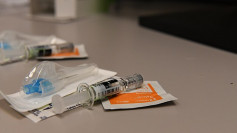A significant recall of various produce items has been issued across 18 states due to concerns over potential listeria contamination. Ohio-based Wiers Farm Inc. initially recalled cucumbers sold at select Walmart stores, but the recall has now expanded to include a broader range of products sold at major retailers like Aldi, Kroger, and Walmart.
The recall, announced earlier this month, was a precautionary measure after officials suspected that some whole and bagged salad cucumbers might be contaminated with listeria monocytogenes. This bacterium can cause listeriosis, a severe infection that affects approximately 1,600 people annually in the United States, with some cases proving fatal.
On Monday, Wiers Farm Inc. extended the recall to include additional produce items such as green beans, peppers, jalapenos, zucchini, and yellow squash. The U.S. Food and Drug Administration (FDA) released a notice detailing the affected products, which were packed between July 5-12 and distributed to stores across 18 states.
The recalled items include:
- Wiers Farm Bagged Poblano - UPC 073064202581 - 16 oz bag
- Wiers Farm Bagged Cubanelle - UPC 073064201836 - 16 oz bag
- Wiers Farm Bagged Green Beans - UPC 073064200846 - variable weight bag
- Wiers Farm Bagged Salad Cucumber - UPC 073064459619 - 2 lb. bag
- Wiers Farm Bagged Serrano - UPC 073064201829 - 4 oz bag
- Wiers Farm Organic Bell Pepper - UPC 073064201416 - 2 count tray
- Wiers Farm Organic Cucumber - UPC 073064201423 - 2 count tray
- Wiers Farm Organic Yellow Squash - UPC 073064201447 - 2 count tray
- Wiers Farm Organic Zucchini Squash - UPC 073064201430 - 2 count tray
Additionally, items sold under the Freshire Farms brand at Aldi stores in Kentucky, New York, Ohio, Pennsylvania, and West Virginia are also part of the recall. The affected products include 16-ounce bags of green beans and 8-ounce bags of jalapenos.
Sixteen produce items sold individually or by the pound are part of the recall, such as Anaheim peppers, cilantro, green bell peppers, habanero peppers, and tomatillos. These items were distributed to various grocery chains, including Walmart, Kroger, Save-a-Lot, Shop N Save, and others across multiple states.
The FDA has confirmed that no illnesses or consumer complaints have been reported in connection with the recall so far. However, consumers are urged to discard any of the listed products if they have them at home. "Consumers who have consumed the affected product and are experiencing symptoms such as fever, muscle aches, and gastrointestinal issues should seek medical attention," the FDA alert stated.
Listeria monocytogenes is particularly dangerous for pregnant women, newborns, older adults, and individuals with weakened immune systems. It can cause severe and sometimes fatal infections. Symptoms of listeriosis include fever, muscle aches, nausea, and diarrhea. In more severe cases, the infection can spread to the nervous system, causing headaches, stiff neck, confusion, loss of balance, and convulsions.
The expanded recall highlights ongoing concerns about food safety and the potential risks associated with listeria contamination. Wiers Farm Inc. has advised consumers to check their produce and discard any items listed in the recall. Those with questions or concerns can contact the company directly at (419) 933-2161 or via email at customercare@wiersfarm.com.
The recall underscores the importance of vigilance in monitoring food safety and the swift action required to protect public health. As listeria-related incidents continue to surface in the U.S., consumers are reminded to stay informed about potential risks and to heed recall notices promptly.
This latest incident is part of a broader trend of food safety recalls, emphasizing the need for rigorous safety protocols and oversight in the food industry. The FDA's continued monitoring and prompt action are crucial in preventing potential outbreaks and ensuring the safety of the nation's food supply.
For more information on the recall and the list of affected states and retailers, consumers can visit the FDA's website or contact their local grocery stores.






